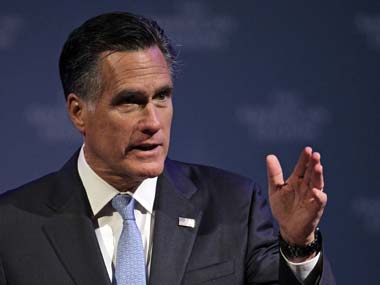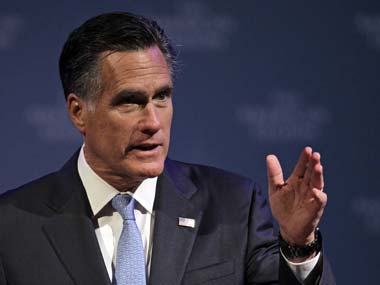New York: President Barack Obama and his Republican rival Mitt Romney have been on a do-or-die mission to get voters to the polls on Tuesday. This, finally, is it. After months of campaigning, billions spent in advertising and weeks of early voting, Americans will have their say. It’s US Election Day 2012, and polls open at 6:30 on Tuesday and don’t close until 7:30 pm.
Polling agencies seem to agree that Obama’s position has strengthened since Hurricane Sandy. The question is: will it be enough? Romney has the upper hand in Florida, the two are in a dead-heat in Virginia, and Obama is ahead in New Hampshire and Ohio. But that still means Romney is the underdog, because just winning Virginia and Florida won’t get him the magic 270 electoral votes to get to the White House.
The latest New York Times/CBS News poll has Obama leading Romney among likely voters 48 percent to 47 percent. The ABC/Washington Post puts the odds at 49 percent to 48 percent favoring Obama.
Obama even leads in a straw vote at Harry’s Bar, an iconic Paris institution that drew the likes of Hemingway, Fitzgerald and Gershwin and served as a haunt for generations of US expats. It has held straw polls before US elections since 1924 and only got the results wrong twice: Jimmy Carter in 1976 and George W Bush in 2004.
Romney win may mean risk-on trade
[caption id=“attachment_513328” align=“alignleft” width=“380”]
 The market sees Mitt Romney as a friend. AP[/caption]
The market sees Mitt Romney as a friend. AP[/caption]
The rebound in US and emerging markets from this summer is beginning to stall ahead of the US presidential election and the uncertainties wrapped up in the results. The markets are concerned about what a political stalemate will mean for the fiscal cliff. Business leaders feel that the US is more likely to avoid going over the fiscal cliff with a Romney presidency.
Impact Shorts
More ShortsMarket reaction to a Romney win is also likely to be positive, largely because of his plan to cut taxes on capital gains and dividend, as well as for corporations.
“I think Romney is portrayed aptly as a candidate that could more readily come to a compromise with the opposition,” said David Rosenberg, chief economist and strategist at Gluskin Sheff.
Obama has been unable to make any headway with Republicans in addressing the fiscal cliff, at least to date, and the looming deadline is spooking the financial markets. World leaders urged the US this weekend to act decisively to avoid a rush of spending cuts and tax hikes. The fiscal cliff is the biggest short-term threat to global growth and has much to do with US taxes. If the Bush-era tax cuts expire as scheduled in December this year, most Americans will be face a crushing tax bill on 15 April 2014.
America’s bitterly divided Congress has to move swiftly to reach a deal after the US elections on Tuesday, about $600 billion in government spending cuts and higher taxes, which are otherwise set to kick in from 1 January. Economists have warned that if the Bush-era tax cuts expire, it could push the US economy back into recession.
“A complete sweep by the Republicans might reduce the chances of a gridlock in Washington, which would lessen the impact of the fiscal cliff. A polarized election might complicate a rapid resolution of the fiscal cliff, while an Obama victory would almost guarantee the continuation of low interest rates in the US,” Pablo Goldberg, HSBC Emerging Markets Research Head told Barron’s.
US business is unabashedly rooting for Romney and has poured funds generously into his campaign war chest. In 2008, Wall Street generally favoured Obama-Biden over McCain-Palin by a large margin. But Wall Street’s biggest investment firms have fallen decidedly out of love with the president. Thanks to campaign finance filings, it’s possible to put a price tag on just how much: Romney’s presidential campaign and the super PAC supporting it out-raised Obama among financial-sector donors $37.1 million to $4.8 million.
US business feels Obama represents the same-old-same-old ideas and is skeptical about him tackling stubborn unemployment, which is stuck at 7.9 percent.
Beyond the US election, global fund managers are waiting for signs of a fiscal cliff resolution that could be the next catalyst to get more of their investing money back to work.
Bigger turnout will help Obama
As a general proposition, if turnout is higher, that’s probably good news for Obama. If it’s lower, that’s probably good news for Romney as the typical Republican voter is seen as more dogged and likely to actually vote. Quintessential Democrat supporters are more laidback about showing up on Election Day.
Romney’s supporters are likely to show up this time in big numbers. The question is will Obama’s supporters brave the rain and the cold to queue up on Tuesday outside polling booths, despite not being as pumped up as in 2008. Obama has a huge lead over Romney with African Americans and Hispanics but will they vote? On the whole, Democratic enthusiasm has been lower than when Obama won in 2008.
Pre-election polling shows Romney winning the white vote comfortably, while Obama wins the nonwhite vote by wide margins.
)